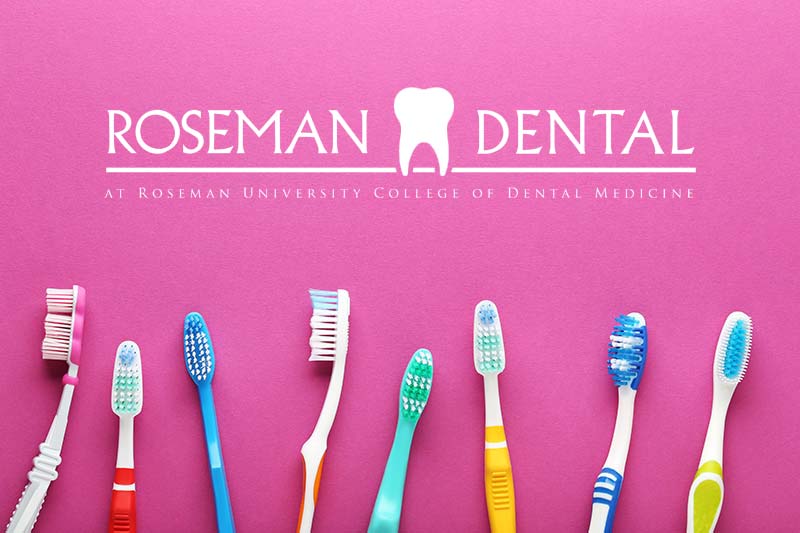
by Roseman Dental | Oct 5, 2022 | Dental Clinic Blog, Oral Health, Roseman Dental - NV, Roseman Dental - UT
Trick-or-treating is the highlight of Halloween for most children, but excessive candy consumption can be harmful to a child’s dental and physical heath. Halloween doesn’t have to be a sugar-laden free-for-all. There are many ways to limit your child’s sugar intake without a making a scary scene.
- Collect Less Candy – Limit the amount of candy your child collects by having her use a smaller treat bag and calling it quits once the bag is filled. You can also set a time limit on her trick-or-treating or visit only houses within a certain walking distance.
- Trade Candy For Cash – Many dentists participate in a candy buyback program. If yours doesn’t, consider forking out some of your own cash in exchange for your kid’s candy, then donate the stash to a local shelter or a branch of the military.
- Plan a Visit From the Candy Fairy – If your child is too young to be interested in cash, consider swapping the loot for a toy they have had their eye on. Instruct your child to leave the goodies in a special location, and make the trade while they are asleep.
- Ration the Goodies – Let your child pick out a few of his favorites on Halloween night, then store the rest out of sight and out of reach. Pack one small piece in his or her lunch each day, or save it to dole out only on special occasions.
- Pass Out An Alternate Treat – You can do your part to limit junk food in your neighborhood by passing out something other than candy. Stock up on stickers, glow sticks or another prize to give away, and encourage your neighbors to do the same.
However you choose to prevent sugar overload this holiday, be sure your child knows what to expect beforehand. Fill her up with a healthy dinner before she begins knocking on doors, and allow a little indulging before the night is over. Have a plan for the rest of the candy, and no matter how late your little ghoul is up, don’t send her to bed without brushing!

by Roseman Dental | Oct 1, 2022 | Dental Clinic Blog, Oral Health, Roseman Dental - UT
Brushing and flossing regularly are essential habits for healthy teeth, but did you know that nutrition is also important to the overall health of your mouth? It’s especially important to help kids start healthy eating habits while they’re young and their teeth are still developing. Here are the top nutrition tips to keep your family’s oral health strong.
1. Don’t Put the Baby to Bed with a Bottle
Many people like to put their baby to bed with a bottle of milk or other drink. However, this seemingly harmless practice actually allows bacteria to flourish and can lead to tooth decay. Giving your baby a bottle at night is okay, but make sure you follow it up with a gentle tooth-brushing session (or simply wiping their gums with a warm washcloth if they don’t have teeth yet) before putting your baby in bed.
2. Eat Plenty of Fresh Vegetables and Fruits
The standard American diet is extremely high in sugar. While avoiding sugar entirely may not be practical, it is best to limit consumption of sweets and sodas since they increase the risk of cavities. Even so-called “fruit” drinks contain highly concentrated amounts of sugar and should not be consumed in excess. Make sure to check the nutrition facts to get the real scoop on how much sugar is involved, even if a beverage claims to be fruit-based. If you or your children do have sweets, make sure to brush soon afterwards.
3. Avoid Sugary Foods
The standard American diet is extremely high in sugar, and while it may not be practical to avoid sugar altogether, it is best to limit consumption of sweets and sodas since they increase the risk of cavities. Even so-called “fruit” drinks contain highly concentrated amounts of sugar and should not be consumed in excess. If you or your children do have sweets, make sure to brush soon afterwards.
4. Drink Water with Food
Drinking water with each meal helps to wash away food particles and bacteria that might otherwise become stuck on or between the teeth and contribute to tooth decay. Taking a drink of water immediately after a meal serves the same purpose and can keep your mouth from becoming too dry.
A nutritious diet is just as important for oral health as brushing and flossing. Improving your current diet can be as easy as adding an extra portion of vegetables or fruit to a meal, eating fewer sweets, and increasing your water intake. Small changes can make a big difference.
Talk with your dentist about how your nutrition and oral health are connected. If you don’t have your next check-up on the calendar yet, make an appointment with Roseman Dental for affordable quality dental care.

by Roseman Dental | Sep 7, 2022 | Dental 360, Dental Clinic Blog, Oral Health, Roseman Dental - NV, Roseman Dental - UT
Periodontal disease occurs when the plaque that adheres to the teeth is not effectively removed. Plaque forms when bacteria in the mouth combine with mucus, creating a sticky and damaging substance that attaches to the teeth. Brushing and flossing regularly does certainly help minimize the formation of plaque, but any plaque that remains often turns into something called tartar, which cannot be easily brushed or flossed away at home. This is just one reason regular dentist visits are so essential!
To reduce the chances of developing gum disease, it’s important to recognize risk factors. Here’s a look at some of the things that commonly lead to gum disease and ways to prevent them from getting that far:
Genetic Makeup
Each person’s genetics play an important role in determining how healthy their teeth and gums are. So much so, in fact, that some researchers believe that as much as 30% of the population is especially susceptible to gum disease. However, even those who are predisposed to the issue can dramatically reduce their chances of developing it simply by engaging in strong oral hygiene practices. In this case of nature vs. nurture, go for nurture.
Stress Levels
While stress in and of itself isn’t a direct contributor to periodontal disease, it has a tendency to weaken the overall immune system. This means that fighting off infections will be tougher in general. In other words, if you’re in the beginning stages of gum disease and are particularly stressed out, it will likely exacerbate the problem. Talk to a doctor if you need help managing stress and its affects.
Smoking Habits
If someone doesn’t already suffer from periodontal disease, smoking may cause it to develop. If someone is a smoker and already has symptoms of gum disease, continuing the habit will only make the problem worse. The more someone smokes, the greater their risk, so cutting down an existing habit (or better yet, quitting entirely) can pay off in the form of improved oral health.
There are many risk factors associated with periodontal disease. The easiest and most effective ways of reducing the chance of developing it is to practice strong brushing and flossing habits, and visit the dentist at regular intervals. If your next appointment isn’t on the calendar yet, make one with Roseman Dental to keep those gums and teeth healthy.

by Roseman Dental | Apr 11, 2022 | Dental Clinic Blog, Oral Health, Roseman Dental - NV, Roseman Dental - UT
Oral hygiene is essential for your overall wellbeing, not just your oral health. In fact, gum disease is a major risk factor for developing certain dangerous health conditions, such as diabetes and heart disease. Brushing regularly is one of the best methods for keeping your teeth and gums healthy. However, how do you know which toothbrush is best to use?
Tips for Choosing a Toothbrush
There are specific features to look for in a toothbrush, regardless of whether it is powered or manual. The variety of styles, sizes, and shapes of toothbrushes available can make choosing the right one overwhelming. Here’s what to look for:
- Expert recommendations. Look for powered or manual toothbrushes with the American Dental Association Seal of Approval. You can also ask your dentist for a recommendation to ensure your toothbrush has passed quality control tests for safety and cleaning effectiveness.
- Bristle options. Manual toothbrushes or replacement heads for your electric toothbrush are available with hard, medium, or soft nylon bristles. Soft bristles are the safest and most comfortable option for most people. You could damage the enamel protecting your teeth, root surface, and gums depending on the strength of the bristles and how vigorously you brush your teeth. Rounded bristle tips offer even more protection.
- Toothbrush head size. The best size of toothbrush head is one that permits easy access to the surfaces of all your teeth. A toothbrush head that’s one-inch tall and a half-inch wide is easy to use for most adults and can reach all of your teeth efficiently. The toothbrush should have a long enough handle to hold it comfortably in your hand.
Make sure to replace your toothbrush every three months or when it begins to show wear, whichever comes first. It is also vital to replace your toothbrush after you’ve had a cold because the bristles can accumulate bacteria and result in reinfection.

by Roseman Dental | Mar 7, 2022 | Dental Clinic Blog, Oral Health, Roseman Dental - NV, Roseman Dental - UT
Keeping up with your oral health is a daily task. It may be tempting not to take the time for regular dental maintenance, whether at home or at the dentist’s office. However, like so much in life, slacking on dental hygiene doesn’t pay.
Routine Home Cleanings
Brush or floss after every meal, or at least twice a day, to ensure the health of your teeth and gums, you should brush and floss after each meal. Flossing removes bits of food that toothbrushes may not be able to reach. If these pieces of food aren’t removed, they provide nourishment for bacteria, which excrete acid that destroys tooth enamel and causes cavities.
Flossing and brushing also gets rid of plaque, a sticky substance that can cause gum disease, tooth discoloration, and even tooth decay. Plaque that isn’t removed can harden into tartar, which can then lead to gingivitis and periodontal disease. Fortunately, most of these problems can be prevented with a simple routine of brushing and flossing regularly.
Regular Dental Checkups
Almost half of Americans put off regular dental care or previously planned treatment during the COVID-19 pandemic. As we enter a new stage of the pandemic, made more manageable with vaccines and boosters readily available, it’s time to re-book those postponed check-ups and procedures.
In addition to good dental hygiene at home, make sure to visit the dentist twice a year, or about every six months. The dentist will check for cavities and treat them before they become serious. He or she will also scrape away tartar and plaque buildup, and can treat gingivitis before it becomes full-blown gum disease. Visiting the dentist regularly is crucial to maintaining a beautiful smile for years to come.
Reduced Costs
Aside from the medical benefits of regular dental care, there are financial reasons to keep at it as well. Many insurance plans will pay for most or all of the price of regular dental appointments, but may cover less of the cost for more expensive procedures. For instance, while most patients with insurance pay around 20 percent of their exam fee and the price of getting a cavity filled, they could pay 50 percent of the cost of root canals, crowns or bridges. These procedures can sometimes be avoided with preventive care that finds the problem early and provides treatment. By structuring their payment schedules this way, insurance companies financially incentivize their patients to prevent dental problems rather than repair them after they become more serious. Take advantage of this structure by getting regular cleanings and check-ups.
As the saying goes, “An ounce of prevention is worth a pound of cure.” Apply this maxim to your oral health, and save yourself pain and money. If it’s been awhile, make an appointment with Roseman Dental and set yourself up for better dental health.







